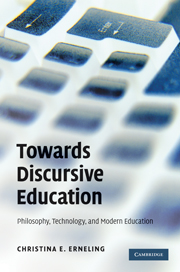Book contents
- Frontmatter
- Contents
- Acknowledgements
- Introduction
- 1 The infantilisation of learning
- 2 Educational technologies and pedagogy
- 3 Piaget and natural learning
- 4 Piaget's conception of the framework: from instincts to intentionality
- 5 The infant as scientist
- 6 The socio-cultural approach to learning
- 7 Towards discursive education
- Appendix
- References
- Index
5 - The infant as scientist
Published online by Cambridge University Press: 05 June 2012
- Frontmatter
- Contents
- Acknowledgements
- Introduction
- 1 The infantilisation of learning
- 2 Educational technologies and pedagogy
- 3 Piaget and natural learning
- 4 Piaget's conception of the framework: from instincts to intentionality
- 5 The infant as scientist
- 6 The socio-cultural approach to learning
- 7 Towards discursive education
- Appendix
- References
- Index
Summary
INTRODUCTION
In Chapter 2 we saw how Seymour Papert in particular compared infant learning to learning in school and to scientific activity. The idea of comparing children with scientists goes back to Piaget, but has moved beyond his initial interest in the matter. One of Piaget's strongest motivations, if not the strongest, for studying intellectual development in children was to get a better grasp of scientific reasoning (see for example Piaget, 1970, p. 1). Even more important was the fact that in his genetic epistemology, he took science as the paradigm form of knowledge. Furthermore, his view that all knowledge acquisition is determined by the same biological laws, and his belief in the process of equilibration through assimilation and accommodation, set the foundations for a continuity between cognitive development and science. In addition, Chomsky's view of language acquisition as hypothesis testing gave further credence to the idea of children as small scientists (Leudar and Costall, 2004; Leudar, Costall, and Francis, 2004). This conception of cognition has had a profound influence on contemporary psychology, resulting in what is known as the ‘theory theory’ and the ‘theory of mind’ approaches, and is also found in some versions of evolutionary psychology. These have become some of the central and fastest-growing areas in psychology, and would deserve a book (or several) of their own. Let me, however, focus on some problems which are more immediately relevant to my overall argument.
- Type
- Chapter
- Information
- Towards Discursive EducationPhilosophy, Technology, and Modern Education, pp. 109 - 128Publisher: Cambridge University PressPrint publication year: 2010



